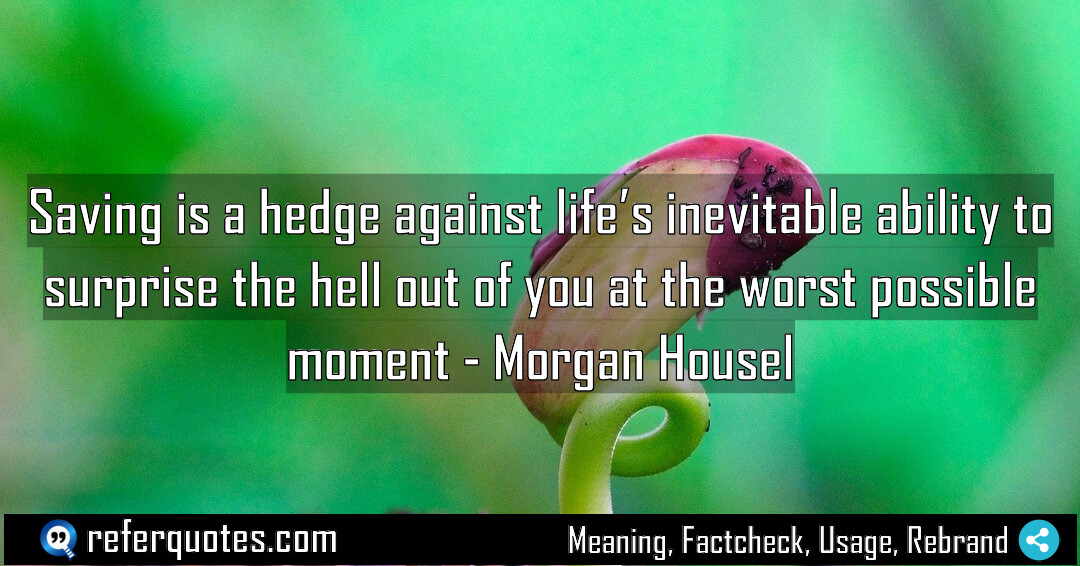
Saving is a hedge against life’s inevitable ability to surprise you when you least expect it. It’s not about getting rich; it’s about buying peace of mind and creating options for yourself when things go sideways. Think of it as your personal financial shock absorber for all of life’s potholes.
Share Image Quote:
Table of Contents
Meaning
At its core, this quote means that saving money is your primary defense against the unpredictable and often costly surprises that life throws your way.
Explanation
Let me break this down for you. We all operate on this assumption that tomorrow will look roughly like today. But life doesn’t work like that. The car *will* break down. The water heater *will* burst. You might get a fantastic job offer in another city that requires a move you didn’t see coming. Saving money isn’t a boring financial chore. It’s a strategic move. It’s the gap between “Oh my god, this is a catastrophe” and “Okay, this is an inconvenience we can handle.” It’s the power to turn a panic-inducing emergency into a manageable problem.
Quote Summary
Reading Level50
Aesthetic Score70
Origin & Factcheck
This gem comes straight from Morgan Housel’s fantastic book, The Psychology of Money, which was published in 2020. It’s a modern classic for a reason. You won’t find this one misattributed to Warren Buffett or anyone else; it’s pure Housel, capturing his unique talent for linking human behavior with practical finance.
Attribution Summary
Where is this quotation located?
| Quotation | Saving is a hedge against life’s inevitable ability to surprise the hell out of you at the worst possible moment |
| Book Details | Publication Year: 2020; ISBN-10: 0857197681; ISBN-13: 978-0857197689; Pages: 256 (approx.) |
| Where is it? | Approximate chapter: Saving |
Context
In the book, Housel isn’t talking about saving for a Lamborghini. He’s framing savings in a much more profound, psychological way. He argues that the real return on your savings isn’t just the interest rate the bank gives you. It’s the optionality and the sleep-at-night factor it provides. It’s the ability to wait for a great opportunity or walk away from a bad situation without financial ruin.
Usage Examples
Here’s how you can actually use this wisdom:
- For a young professional: Explain that their emergency fund isn’t just for job loss. It’s for a last-minute flight to see a sick relative, or to cover rent if a roommate bails unexpectedly.
- For a parent: Frame the college fund not just as tuition money, but as a buffer that allows their kid to take an unpaid internship or study abroad without being crushed by debt.
- For a team you’re leading: Use it to justify building a robust business contingency fund. It’s not being pessimistic; it’s being prepared so that a single client leaving or a supply chain hiccup doesn’t derail the entire company.
To whom it appeals?
Share This Quote Image & Motivate
Motivation Score60
Popularity Score80
Shareability Score75
FAQ
Question: Is this just about having an emergency fund?
Answer: It’s bigger than that. An emergency fund is the first layer, sure. But this philosophy extends to all your savings—it’s the reason you don’t leverage yourself to the hilt. It’s the capital that gives you the courage to make bold life and career moves.
Question: How much is “enough” for this kind of safety net?
Answer: There’s no single number. It’s the amount that lets you absorb a major financial hit—a medical bill, a car repair, a few months of unemployment—without having to sell your long-term investments or go into debt. For most people, that’s 3-6 months of expenses, but more is almost always better for your peace of mind.
Question: Doesn’t focusing on “surprises” promote a fearful mindset?
Answer: Actually, it’s the opposite. It promotes empowerment. Knowing you have a buffer allows you to be *less* fearful day-to-day. You stop worrying about every little financial wobble because you know you’re prepared. It’s not paranoia; it’s prudence.
Similar Quotes
You know, I’ve seen so many people chase the next hot stock or try to time the market perfectly, but the habit of regularly saving and investing is what truly…
Risk is what’s left over when you think you’ve thought of everything. It’s the humbling reality that our best plans are always incomplete. This quote captures the fundamental blind spot…
Don’t save it all for the end is a powerful wake-up call. It’s about rejecting the deferred-life plan and starting to live on your own terms, right now. Table of…
You know, the essence of investing is not knowing what will happen… it’s about having a rock-solid plan for every possible outcome. It’s the single biggest mindset shift that separates…
Staying vulnerable is a risk we have to take if you want to live a wholehearted life. It’s the counterintuitive secret to real connection and courage, not a sign of…
